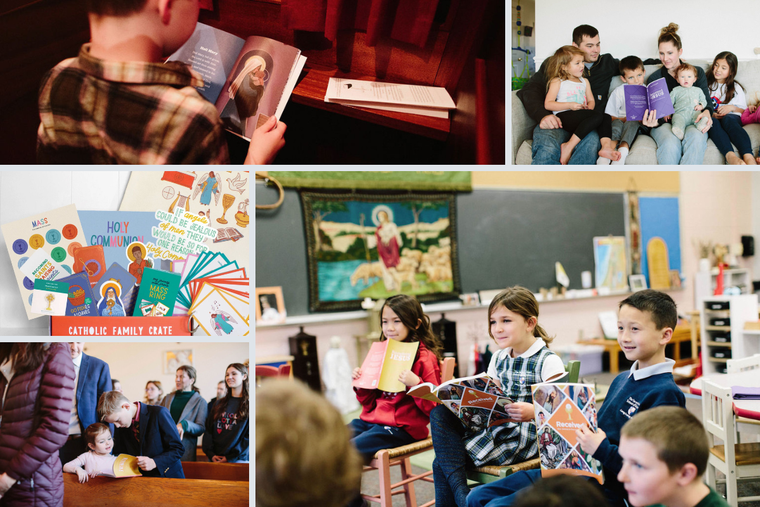Catechetical Toolbox: New Resources Support Students, Parents and Teachers During Sacramental Preparation
Ascension Press’ ‘Renewed’ and ‘Received’ and Catholic Family Crate offer practical aids for families and parishes.

Sacramental preparation presents an ever-changing challenge for the Church. The timeless gift of the sacraments is paired with the necessity to meet the needs of the world today. While the truths we believe remain unchanged over the centuries, there is a necessity for new methodology to reach a modern audience.
In his apostolic exhortation on evangelization in the modern world, Pope Paul VI wrote that children need to learn “the living content of the truth which God has wished to convey to us and which the Church has sought to express in an ever richer fashion during the course of her long history” (Evangelii Nuntiandi, 44).
Supporting parents as their children prepare to receive sacraments unfortunately can become a missed opportunity for parishes and schools. As the first and most important catechists of their children, parents should be offered meaningful resources as they journey together as a family toward heaven.
Modern tools, faithful catechesis, support for parents and authentic evangelization — these elements can all be found in Ascension Press’ new first reconciliation and first Communion preparation program.
Renewed: Your Journey to First Reconciliation and Received: Your Journey to First Communion expertly weave together both digital and print materials, and the cooperation of both parish and home is encouraged as they work together to prepare children. With courses online for not only the students but also the parents and catechists, each person involved in the preparation process is supported with video and written content.
Pulling from the expertise of both priests and catechists as well as other parents, the videos for leaders and families include trusted speakers such as Father Mike Schmitz, Father Josh Johnson, Sister Josephine Garrett, of the Sisters of the Holy Family of Nazareth, Jackie and Bobby Angel, Daniël and Emily Wilson Hussem and Mari Pablo.
For families, the “Parent Certification” course offers videos, discussion questions and prayer. Far more than a worksheet to do at home or just a summary of the child’s lesson, this course guides parents as they accompany their child on their faith journey. The video topics offer content such as the mission of a family, the gift of mercy and forgiveness in a home, and encouragement for attending Mass with young children. The “Parent Guide” shares key content of the student lessons and then talking points to continue the conversation and reflection at home.
Another unique element of Renewed and Received is the collection of resources for the catechists. Offering much more than just a teacher’s guide with an answer key, the “Parish Leader” portion of the program provides actual training and support. Many catechists are volunteers, and most are not certified teachers by trade. The practical content in the training videos, as well as in the “Leader Guide,” includes tools for classroom management, building relationships with parents, and facilitating prayer experiences.
Notably, the online leader certification incorporates a session on differentiated instruction. Guided by Charleen Katra, the executive director of the National Catholic Partnership on Disabilities, catechists receive information on the background of diverse learners (such as students with autism or Down syndrome) as well as specific strategies for support in the classroom. This is an important and necessary element of catechetical programs that is often lacking.
In addition to the student textbook and suggested activities, the student video series for Renewed and Received takes a creative approach to engagement. Chronicling the story of one child as she prepares for her first confession and first Communion, the 24 short videos “show” rather than just “tell” about sacramental preparation.
In the words of Felicity, the spunky main character of the student videos, “I’ve got some questions.” Through genuine experiences and conversations, Felicity learns more about not only the sacraments, but God’s plan for her life. As she grows in understanding and virtue, Felicity is guided by her parents, older brother, godparents, parish priest and friends leading up to her first Confession and receiving Holy Communion. The relatable conflicts and honest dialogue in Felicity’s story make these videos a perfect connecting point for the young students during their own time of sacramental preparation.
Alongside the solid and engaging catechesis from Renewed and Received, family support can also come from Catholic Family Crate’s new sacrament collection. With a crate for Communion and another for reconciliation, Catholic Family Crate continues its ministry of creating “remarkable resources to build a remarkable faith at home.”
Shipped directly to a family’s home, the crates are filled with bright, fun, interactive activities. Each crate combines practical tools, like a Mass bag or a pocket kids’ examination of conscience, with games like “Sin Squash” or “Go Fishes and Loaves.” A ring of cards with favorite Catholic prayers and another set with the parts of the Mass provide practical, age-appropriate engagement for kids during Mass or family prayer. Receiving one of these crates as a gift from a godparent or grandparent, or even from their parish as part of their year of formation, would be an effective technique to engage children in a way that honors their development and abilities. Also included in the Renewed and Received resources are links to fun sacramental activity pages created by Catholic Family Crate that can be downloaded for free and used at home.
Ascension Press’ Renewed and Received curriculum and Catholic Family Crate’s sacrament collection certainly are fulfilling the call to use modern methods to present the eternal truths of the gift of the sacraments. As Pope Paul VI said, “The methods must be adapted to the age, culture and aptitude of the persons concerned; they must seek always to fix in the memory, intelligence and heart the essential truths that must impregnate all of life” (Evangelii Nuntiandi, 44).

















